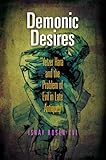Demonic Desires : "Yetzer Hara" and the Problem of Evil in Late Antiquity / Ishay Rosen-Zvi.
Material type: TextSeries: Divinations: Rereading Late Ancient ReligionPublisher: Philadelphia : University of Pennsylvania Press, [2011]Copyright date: ©2012Description: 1 online resource (264 p.)Content type:
TextSeries: Divinations: Rereading Late Ancient ReligionPublisher: Philadelphia : University of Pennsylvania Press, [2011]Copyright date: ©2012Description: 1 online resource (264 p.)Content type: - 9780812243390
- 9780812204209
- 296.3/16 22
- BJ1406 .R64 2011
- online - DeGruyter
- Issued also in print.
| Item type | Current library | Call number | URL | Status | Notes | Barcode | |
|---|---|---|---|---|---|---|---|
 eBook
eBook
|
Biblioteca "Angelicum" Pont. Univ. S.Tommaso d'Aquino Nuvola online | online - DeGruyter (Browse shelf(Opens below)) | Online access | Not for loan (Accesso limitato) | Accesso per gli utenti autorizzati / Access for authorized users | (dgr)9780812204209 |
Browsing Biblioteca "Angelicum" Pont. Univ. S.Tommaso d'Aquino shelves, Shelving location: Nuvola online Close shelf browser (Hides shelf browser)

|

|

|

|

|

|

|
||
| online - DeGruyter National Dreams : The Remaking of Fairy Tales in Nineteenth-Century England / | online - DeGruyter One Family Under God : Love, Belonging, and Authority in Early Transatlantic Methodism / | online - DeGruyter Competitive Elections and the American Voter / | online - DeGruyter Demonic Desires : "Yetzer Hara" and the Problem of Evil in Late Antiquity / | online - DeGruyter Everyday Politics : Reconnecting Citizens and Public Life / | online - DeGruyter Hastening Toward Prague : Power and Society in the Medieval Czech Lands / | online - DeGruyter Independence Hall in American Memory / |
Frontmatter -- Contents -- Introduction. The Riddle, or: How Did the Evil Yetzer Become a Mighty King? -- Chapter 1. "The Torah Spoke Regarding the Yetzer": Tannaitic Literature -- Chapter 2. Yetzer and Other Demons: Patristic Parallels -- Chapter 3. Yetzer at Qumran: Proto-Rabbinic? -- Chapter 4. Coming of Age: Amoraic Yetzer -- Chapter 5. Refuting the Yetzer: The Limits of Rabbinic Discursive Worlds -- Chapter 6. Sexualizing the Yetzer -- Chapter 7. Weak Like a Female, Strong Like a Male: Yetzer and Gender -- Afterword. Toward a Genealogy of the Rabbinic Subject -- Notes -- Bibliography -- Subject Index -- Source Index -- Acknowledgments
restricted access online access with authorization star
http://purl.org/coar/access_right/c_16ec
In Demonic Desires, Ishay Rosen-Zvi examines the concept of yetzer hara, or evil inclination, and its evolution in biblical and rabbinic literature. Contrary to existing scholarship, which reads the term under the rubric of destructive sexual desire, Rosen-Zvi contends that in late antiquity the yetzer represents a general tendency toward evil. Rather than the lower bodily part of a human, the rabbinic yetzer is a wicked, sophisticated inciter, attempting to snare humans to sin. The rabbinic yetzer should therefore not be read in the tradition of the Hellenistic quest for control over the lower parts of the psyche, writes Rosen-Zvi, but rather in the tradition of ancient Jewish and Christian demonology.Rosen-Zvi conducts a systematic and comprehensive analysis of the some one hundred and fifty appearances of the evil yetzer in classical rabbinic literature to explore the biblical and postbiblical search for the sources of human sinfulness. By examining the yetzer within a specific demonological tradition, Demonic Desires places the yetzer discourse in the larger context of a move toward psychologization in late antiquity, in which evil-and even demons-became internalized within the human psyche. The book discusses various manifestations of this move in patristic and monastic material, from Clement and Origin to Antony, Athanasius, and Evagrius. It concludes with a consideration of the broader implications of the yetzer discourse in rabbinic anthropology.
Issued also in print.
Mode of access: Internet via World Wide Web.
In English.
Description based on online resource; title from PDF title page (publisher's Web site, viewed 24. Apr 2022)


